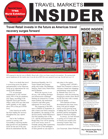The 2021 Summit of the Americas, organized by South American Duty Free Association ASUTIL and the International Association of Airport and Duty Free Stores, along with The Moodie Davitt Report, presented one of the most comprehensive and relevant conference programs focusing on travel retail in the region ever held.
As conference moderator Dermot Davitt, of The Moodie Davitt Report, noted in his introduction, the conference discussed the big issues facing the travel retail industry on the road to recovery, such as the new consumer, industry partnerships, the big picture for travel, and the regional economy.
Opening on behalf of the two associations hosting the Summit, IAADFS Chairman Rene Riedi noted the profound impact that the COVID pandemic has had on the world and the industry.
The World Tourism Organization estimates a $910 billion dollar impact worldwide and 120 million direct tourism jobs lost, he said. “The crisis is not over yet,” he warned, even with vaccinations rolling out. “The industry is still facing ‘a confluence of uncertainties,’ with diminishing prospects for international travel,” he said. Against this background, a clear highlight of the Summit Conference was the daily View from the Top interviews with key CEOs from the region presented in the Knowledge Hub. Over the week Davitt spoke with Martín Eurnekian, CEO of Corporación America Airports and ACI World Chair, Dallas Fort Worth International Airport CEO Sean Donohue, JFKIAT (New York T4) President & CEO Roel Huinink and Vancouver Airport Authority President & CEO Tamara Vrooman.
In today’s issue TMI presents highlights from the first two CEO presentations.
Eurnekian: need for a plan B and better integration of data and systems
Corporacion America Airports CEO & ACI World Chair Martin Eurnekian acknowledged how hard the industry had been hit in South America and the world and warned that recovery will be a long process. The market must adapt to a world where Covid-19 remains an issue, he warned. While the rollout of vaccination programs are allowing governments to lift some travel restrictions (in the U.S.), and he expects this trend to rollout to the rest of the world, nevertheless, Eurnekian argues for the need for a “Plan B” for travel retail.

Conference moderator Dermot Davitt, of The Moodie Davitt Report, speaks with Corporacion America Airports CEO & ACI World Chair Martin Eurnekian.
Plan B, he explained, would entail working together with the governments to adopt a coordinated approach to allow for the safe return of travel. International travel is probably one of the most standardized and coordinated industries in the world. Airlines talk to each other, reservations systems share information.
But the retail sector does not, he said. “Making changes in these systems is really hard which is why it is hard for our retail industry to be fully aligned. This is a next step. We must create new ways to engage with our consumers. We are in conversations with our suppliers on how to create new solutions, new systems, and new ways to engage with the consumers that will allow us to become more effective. At least we know where we want to go.
“We are trying to create a roadmap on integrations and data sharing,” he said.
“What we’re trying to create is a roadmap on integration and data collection and data sharing that will be the raw material that the whole industry will use once we create it,” he said. “We need to propose new solutions, to propose new products that will make us more efficient. But there is no way to do that if the stake-holders in the industry do not talk to each other.
“For the industry to recover systems must be able to talk to each other. Airlines talk to each other and airports but duty free has always been an island. The rest of the tenants are connected and share information that allows the passenger to have a common experience. We need to connect duty free to the rest of the system. This will transform the passenger experience and increase our efficiencies and revenues.”

DFW’s Sean Donohue: Strong concessionaire support and importance of travel connectivity
On Day 2 of the Summit of the Americas, Dermot Davitt spoke with Dallas Fort Worth International Airport CEO Sean Donohue, who spelled out the steps his airport took to survive during the worst of the pandemic and why he is optimistic for future recovery.
DFW was in a stronger position than many other U.S. airports, said Donahue. As a domestic hub for American Airlines, DFW’s 2020 traffic was down 40% on 2019, he reported, a much better rate than the coastal international gateways.
“We’ve been fortunate because American Airlines favored DFW as they tried to recover. …American Airlines brought back a lot of service. In fourth quarter 2020, American carried one out of every three domestic passengers traveling in the U.S.,” he noted. “We have been the busiest airport and the busiest hub.”
As a result, DFW was able to keep many concessions open.
“We went into the pandemic with a strong balance sheet so we were able to take steps to help our partners. The concessionaires are some of our most important partners, many of which are small businesses, local, and quite a few are women and minority owned.
Eliminating MAGs and extending contracts
DFW took steps early on to aid its concessionaires, said Donahue. DFW was one of the first airports to eliminate the minimum annual guarantee (MAGs) payments and most of its operating & mainten-ance fees. The Board has been reviewing these measures in six month increments, and will continue to do so, said Donahue, noting that the DFW Board has just approved another six months of concessionaire relief.
“Since the pandemic started in March/April of 2020, through September of 2021, we will have provided $120 million worth of financial support to our conces-sionaires,” he said.
Recognizing how difficult it has been for its concessionaires, DFW will not be launching as many RFPs as it normally would, said Donahue.
“We are not sure that our partners will have the capital to put into new programs and we need to be sensitive to this. So we just got approval from our Board to add two years of term to all of our concessionaire contracts, to give them certainty and assurance.
Optimistic for recovery
Donahue is seeing progress and pent-up demand from customers who want to travel domestically and with the continued roll out of vaccinations in the U.S., DFW expects to see domestic traffic reach 80% of 2019 levels by this summer. This will be predomin-antly leisure and visiting friends & family travel; business and inter-national travel will take longer, he said.
“We expect to be back to 100% of our domestic travel by spring 2022 but international travel recovery will be closer to 2023,” he said.
Donahue said that DFW’s first priority during the height of the pandemic was the safety of its employees and passengers. DFW continued to see 150,000 passen-gers travel through the airport some days last July and August, so sanitization became a priority in both customer terminals and employee facilities. “We invested in technology, like ultra-violet lights in all of our heating and air conditioning systems and electro-static fogging. But customers don’t see the technology so we started up a ‘Strike Team’ of about 150 people in very visible uniforms who were out in the terminals cleaning the high touch areas. This was more reassuring to our passengers than our technology investments.”
“Touchless” continues to be very important, he said. “We were on this road even before the pandemic, especially when it comes to bio-metrics. We had implemented biometric boarding for all of our international flights prior to the pandemic. Passengers didn’t have to use a boarding pass or even their mobile boarding pass. We had the technology to use facial recognition as the boarding document. We are going to use biometrics more and more to ensure as much of a touchless process as possible.”
DFW’s touchless drive also extends to its concessions, most of whom have implemented some form of touchless pay.
DFW was also one of the first airports to be certified by GBAC, the global sanitization certification program. About two-thirds of DFW’s concessionaires have now been certified by GBAC as well.
Prepared for recovery
One reason to offer concession-aire support is to assure that the operators will be in place to serve the customers when the traffic comes back. Donahue says that about two thirds of DFW’s conces-sions have remained open since last July.
“The financial support helped but they stepped up and were resilient and flexible- and if we do get to 80% of our traffic this sum-mer, we believe that the majority of our concessionaires will be open and able to serve our customers. And this is a positive part of the recovery.”
The DFW Board has been 100% behind these support measures, assures Donahue. “Our strong balance sheet going into the pandemic clearly has helped us. But we will never recover that $120 million [given in support]. In the second half of last year, our revenues dropped by 40%. DFW lost over $200 million. It has been a challenge.”
Terminal C renovation to begin
DFW reduced operating costs, and some capital programs. But last week the airport announced that it had reached agreement with American Airlines and will embark on renovating Terminal C—the one remaining terminal that had not been renovated — over the next several years.
“We are still able to manage the airport in a way I think our part-ners, our Board and our community are proud of,” he said.
Bond market success
DFW was also able to reduce its debt payments.
Donahue explains: “Last year we were one of the first major airports in the U.S. to go back to the bond market and we refunded a couple of billion dollars worth of bonds. We hit the market at a fantastic time last summer and the refund is saving us between $15-30 million a year for the next 15 years. And we pass this saving on to our airline partners.”
Future prospects?
Between 2015-2019 DFW was one of the fastest growing U.S. hub airports in terms of international growth and were on a great trajectory before the pandemic hit.
Donahue says DFW is starting to see international traffic return.
“Emirates just started back service to Dubai, and American announced a return to some of its European destinations. We understand international will be a longer road to recovery but we are excited to see our first non-stop service to Tel Aviv this fall by American. It will be 2022-2023 when we see full international recovery but we will have to be flexible and work with our airline partners.”
DFW had created a very robust international airline incentive program and that has helped bring back some service, said Donahue.
“We had always been strong with traffic to Mexico but our share has increased dramatically com-pared to other U.S. gateways. Mexico is a bright spot for us.”
As for long term effects, Donahue points out that there is an intense debate underway regarding whether hub airports will lose market share to point-to-point itineraries.
“The question is whether hubs will suffer because people don’t want to connect?”
He believes that the ticket price will the deciding factor, and that hub airports will continue to dominate the market post recovery.
“We must recognize that this crisis was the greatest disruptive event in the aviation industry,” he said.
But people want the connection of travel, he concluded. “I am optimistic about the recovery. I find that there’s a spirit to travel… and although it will take a little while to recover, we’ve got to continue working with all of our business partners and concessionaires to help them until the recovery takes full effect. I believe the recovery will take full effect sooner at DFW and that’s a good thing for our partners.”









